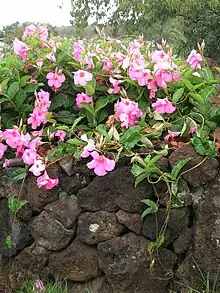| Mandevilla × amabilis | |
|---|---|
 | |
| Scientific classification | |
| Kingdom: | Plantae |
| Clade: | Tracheophytes |
| Clade: | Angiosperms |
| Clade: | Eudicots |
| Clade: | Asterids |
| Order: | Gentianales |
| Family: | Apocynaceae |
| Genus: | Mandevilla |
| Species: | M. × amabilis |
| Binomial name | |
| Mandevilla × amabilis (Backh. & Backh.f.) Dress | |
Mandevilla × amabilis is a species of flowering plant in the family Apocynaceae.[1] It was described in 1974 in the journal Baileya.[2] Also known as Alice du Pont.[3]
Description
Evergreen climbing plant with opposite leaves of thick, rugose texture, with prominent venation. Flowers are pink with a yellow throat.[2]
Range
The species has no natural range, having originated in cultivation in the mid-19th century. It is thought to be a hybrid between Mandevilla splendens and another, unknown species.[4] Conversely, one source[5] says that it is a natural hybrid occurring in Brazil.
Taxonomy
In a molecular analysis, M. × amabilis forms a sister clade to a complex that includes the natural species M. boliviensis and the Sundaville hybrids.[5]
References
- ↑ "Mandevilla amabilis". iNaturalist. Retrieved 2022-03-08.
- 1 2 Lorenzo-Caceres, Jose Manuel Sanchez. "Las especies del género Mandevilla Lindl. (Apocynaceae) cultivadas en Espana" (PDF). arboles ornamentales. Retrieved 2022-03-09.
- ↑ "Mandevilla × amabilis 'Alice du Pont' | mandevilla 'Alice du Pont' Climber Wall Shrub/RHS Gardening". www.rhs.org.uk. Retrieved 3 April 2022.
- ↑ Pacific Island Ecosystems at Risk (PIER)"Pacific Island Ecosystems at Risk (PIER) -- Mandevilla x amabilis RISK ASSESSMENT RESULTS".
- 1 2 Oder, Alev (2016). "A Set of 20 New SSR Markers Developed and Evaluated in Mandevilla Lindl". Molecules. 21 (10): 1316. doi:10.3390/molecules21101316. PMC 6274059. PMID 27706055.
This article is issued from Wikipedia. The text is licensed under Creative Commons - Attribution - Sharealike. Additional terms may apply for the media files.